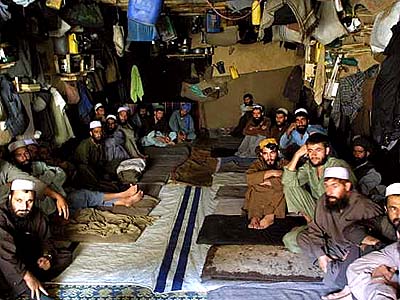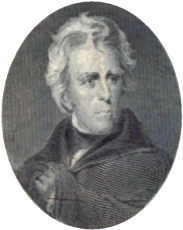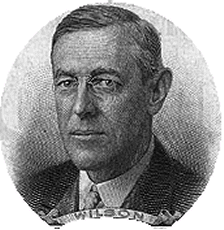It's pretty damn ironic that Andrew Jackson's "memorials of a once powerful race" were made by the same people belonging to the "existing savage tribes." It's even more ironic that the "blessings of liberty, civilization, and religion" led Jackson to defy a lawful Supreme Court and order the forced relocation of the Five Civilized Tribes, leading to thousands of deaths. Their crime: standing in the way of progress.
Too bad Teddy Roosevelt didn't live to see the great civilizations of Nazi Germany, Imperial Japan, and the Soviet Union expand and bring peace to the world. But his peculiarly American myopia was obvious even during his lifetime. The US achieved "peace"...by fighting innumerable Indian wars, conquering part of Mexico, and drenching itself in blood over the slavery issue. Ask the Indians, the Mexicans, or the Confederates if they benefited from America's peaceful wars of conquest.
As for Sen. Beveridge, you have to admire the way he put profit before glory and glory before happiness. He was clearly a man who knew America's priorities and could proclaim them eloquently. Hitler would've been glad to second Beveridge's belief in the superiority of Teutonic people; in fact, he carried this belief to its logical conclusion.
This survey not only exposes our theological cornerstone, but our cultural conerstone as well. America's Judeo-Christian sense of self-righteousness is strong. Everyone can and should help themselves, we believe, or suffer the consequences.
It would be fascinating to ask the same question of Native people who follow their traditional ways. I'd bet good money the response would be different.
To see how America's self-righteous superiority complex manifests itself in the 21st-century global village, see America's Exceptional Values.
"The white people were the very last to speak. It was said that like a younger child they were cry babies, so the creator did everything to soothe them. Hence, they are richer than any of the Indians."
Charles Bowden, The Sonoran Desert, quoting Maricopa Indians speaking to scholars
There are two kinds of white men. There are the Americans, and there are the others. You may give your hand in friendship to the French, or the Spaniards, or the British. But the Americans are not like those. The Americans come from the slime of the sea, with mud and weeds in their claws, and they are a kind of crayfish serpent whose claws grab in our earth and take it from us.
Tenskwatawa (Shawnee), message to his people, c. 1805
Accursed be the race that has seized on our country and made women of our warriors. Our fathers from their tombs reproach us as slaves and cowards. I hear them now in the wailing winds....the spirits of the mighty dead complain. Their tears drop from the wailing skies. Let the white race perish. They seize your land, they corrupt your women, they trample on the ashes of your dead! Back whence they come, upon a trail of blood they must be driven.
Every year our white intruders become more greedy, exacting, oppressive and overbearing. Wants and oppression are our lot.
Tecumseh (Shawnee), Indian council meeting in Alabama, 1811
It is my observation that we are suffering from the attitudes that come from the Christian doctrine of manifest destiny—that one people will rule the world. Inherent in this is the idea that a chosen people have a divine right—nay mission—to dominate the world.
Oren R. Lyons (Onandaga), commencement address at Syracuse University, 1993
[S]omewhere along the way, observed the great political theorist Michel Foucault, our leaders were obliged to adopt a "language of madness" in order to explain away the state's conscious refusal to enforce the very values it claimed as its birthright. Example: an egalitarian, pluralistic society as a secular nation-state erected on the principle of "liberty and justice for all." This is a revolutionary idea, the Big One that we have repeatedly tested at places like Gettysburg, Wounded Knee and Montgomery, Ala., the one we have failed to redeem.
Paul VanDevelder, "Just One More Tribal Tale of Abuse," Los Angeles Times, 1/13/05
It may come as a surprise to some readers to have the United States referred to as a nation that flouts international law, but Chomsky provides ample evidence of US lawlessness, concentrating on the post-World War II era down to recent events in Iraq and the Federal Republic of Yugoslavia. In fact, the pattern of US disregard for law was set quite dramatically in the nineteenth century. Of the more than four hundred treaties that the US Government signed with various Native American nations not a single one was honored.
Richard Modiano, review of Rogue States: The Rule of Force in World Affairs by Noam Chomsky
The white man's religion talks about mastering the earth, which means putting up your towns by water so you can watch your garbage float away.
Oren R. Lyons (Onandaga), quoted in "R.I.P. Tonto," Esquire, February 1994
The mythology of America says go West, till the soil, make more, dig more, anything else is anti-progress. Our society aggrandizes wealth. We don't question its source or its worth. We simply look at it as something to aspire to.
Winona LaDuke (Anishinabe), activist, author, VP candidate
Save for such nascent movements as bioregionalism and Green politics, which have at least questioned the assumptions underlying this attitude, most people in Western society are in agreement about our common superiority. So it becomes okay to humiliate — to find insignificant and thus subject to sacrifice — any way of life or way of thinking that stands in the way of a kind of "progress" we have invented, which is scarcely a century old. In fact, having assumed such superiority, it becomes more than acceptable for us to bulldoze nature and native societies. To do so actually becomes desirable, inevitable, and possibly "divine."
Jerry Mander, In the Absence of the Sacred, 1991
"There is this amazing hegemony of business values, of the values of making money, of the commercial civilization." The result? Ours is now "a society which is entirely devoted to and sanctifying of the making of money."
Stephanie Salter quoting author Susan Sontag, San Francisco Chronicle, 4/29/01

I spent most of my time being a high class muscle-man for Big Business, for Wall Street and for the Bankers. In short, I was a racketeer, a gangster for capitalism.
During those years, I had, as the boys in the back room would say, a swell racket. Looking back on it, I feel that I could have given Al Capone a few hints. The best he could do was to operate his racket in three districts. I operated on three continents.
Major General Smedley Butler, USMC, excerpts from a speech, 1933
The culture and civilization of the Whiteman are essentially material; his measure of success is "How much property have I acquired for myself?"
Ernest Thompson Seton and Julia Seton, "The Soul of the Red Man: His Spirituality," The Gospel of the Redman, 1936
Sociologist Robin Williams lists "racism and group superiority" among dominant American values. He also lists "equal opportunity" but with the proviso that we do not expect equality of condition to ensue. Heirs of the Protestant ethic, Americans worship the "bitch goddess success (Wm James)." The American dream is acquisition of wealth surpassing others.
Jim Wolfe, professor at Butler University, from his website
As long as we pursue this materialistic kind of lifestyle where we make money, and possessions [are] the only ambition in life, we are going to go downhill and eventually destroy ourselves.
Arun Gandhi, grandson of Mahatma Gandhi, LA Times Magazine, 7/29/01
Newsmagazine editors know how to respond to horrific tragedy. They cover it. But what do you do if you're the editor of Vogue or Field & Stream?
The consensus seems to be: You agonize in print about the cosmic meaninglessness of your magazine, then you urge readers to fight terrorism by continuing to do exactly what they were doing before—particularly those activities that the magazine covers.
Peter Carlson, Magazines Search Their Glossy Souls, LA Times, 11/7/01
[I]t is time for the United States not only to be the military superpower it is, or the economic superpower it is, but also the moral superpower that it should be....And it is not [a moral superpower] because its value system is wrong. That is for the US to deal with:...so much greed, so much cynicism, so much hypocrisy, so much individualistic values. These values need to be replaced by more solidarity, by more compassion, by justice.
Oscar Arias Sanchez, 1987 Nobel Peace Prize winner, LA Times, 2/20/00
I believe that if we were able to get rid of all the guns in America and have strong gun control laws, that we would still have the central problem, the central problem of being afraid of the other. And being manipulated so easily by politicians, by corporations, by the media as they appeal to our baser instincts.
We need to change our ethic, and as I hope I've pointed out in the film, to aspire to be more Canadian-like. What is the Canadian ethic? The Canadian ethic is "We're all in the same boat. We're all Canadians." And we don't have that ethic in America. Our ethic is "It's every man for himself. And to hell with you. Me. Me, me, me, me. My, my, I, I, I. I. Pull yourself up by your bootstraps."
Michael Moore, interview, Bowling for Columbine DVD
If today we are shocked by shenanigans like the Enron debacle, insider trading, mutual fund abuses and the prevalence of special interests in politics, we need to get some perspective on our history. Americans, according to McDougall, have always been scramblers, gamblers, scofflaws and speculators. Nearly everyone in early America, it seems, wanted to know not what's good for the English crown or the colony or the nation, but "what's in it for me." Of course, there were honest righteous people, religious and high-minded people, who spoke out against excesses and abuses. But their idealistic voices only made Americans feel good about themselves without seriously diminishing the overall scramble for profit.
Gordon S. Wood, review of Freedom Just Around the Corner by Walter A. McDougall, NY Times, 3/28/04
U.S. ideologues ignore cultural orientations that make the purpose of capitalism in many East Asian countries different from that of serving only the short-term interests of shareholders. They also wildly overstate the attractiveness of the American model. As John Gray, a professor at the London School of Economics, puts it, "The claim of the United States to be a model for the world is accepted by no other country. The costs of American economic success include levels of social division—of crime, incarceration, racial and ethnic conflict and family and community breakdown—that no European or Asian culture will tolerate."
Chalmers Johnson, president of the Japan Policy Research Institute and author of Blowback: the Costs and Consequences of American Empire, LA Times, 3/21/01
The desire for an egalitarian society is a universal pursuit. It's what the great philosophers and the scriptures of most major religions teach, yet it's viewed by many as utopian at best and subversive at worst.
Not unexpectedly, those who preach its antithesis are those who profit most from what Dwight D. Eisenhower warned us about: the "military industrial complex." Or as Mulder from "The X-Files" has coined it: "The military-entertainment-industrial complex."
Patrisia Gonzales and Roberto Rodriguez, "Revising the End of the 3rd Millennium," 12/31/00
How dare the world kick us off the U.N. Human Rights Commission. Are we not the country that teaches our children that murder is wrong by executing killers? Are we not the country that puts guns in the hands of all our disgruntled, disenfranchised and unstable citizens? Are we not the country that sends our friends and family to prison to be raped and ruined for minor drug offenses? Are we not the country that denies our AIDS and cancer victims a drug that provides relief and may help them live longer?
Can't the rest of the world see us for the compassionate, Christlike people we are?
Christopher Huskin, letter, LA Times, 5/17/01

The United States, which I dearly love in spite of her faults, has always been a warrior society because that was the way of the world and the fastest road to prosperity.
FileKeeper, posted on the Net, 8/21/00
Contrary to the mythical self-image of the United States as a peaceloving nation, war has always been an integral part of American patriotism.
Ira Leonard, Violence is the American Way, AlterNet, 4/22/03
America's indiscriminately lethal arrogance and psychotic sense of self-entitlement have long since given the great majority of the world's peoples ample cause to be at war with it.
Ward Churchill, Some People Push Back: On the Justice of Roosting Chickens, c. 9/12/01
The United States appear to be destined by Providence to plague America with misery in the name of liberty.
Simón Bolívar (1783–1830)
Many Americans just don't have any conception that our crap can stink -- or even that we crap at all. Somehow we are different from the other citizens of the world, from other countries. And they have little ability to relate to the differences in thinking and living of others around the world.
GJ Moss, Understanding Our National Denial About Iraq, 6/7/05
[Americans] hold that all peoples are free to think for themselves, decide for themselves, even draw apart from the rest of the world if they so desire. But you are either with them or against them, and they reserve the right to interfere in the self-determination of any nation to the benefit of themselves. All of this is meaningless to America, because Americans can't see these things. The righteousness of America, however seemingly un-right, however brutal, however transparently self-serving, cannot be disputed. And they believe this. It is their blind spot. A flaw in their thinking process.
KS, Back in the USSA, 11/22/01
They unceasingly harass you to extort praise and if you resist their entreaties, they fall to praising themselves.
Alexis de Tocqueville, Democracy in America, Volume 1, Chapter XVI, 1840
A single word indicative of doubt, that anything, or everything, in that country is not the very boil in the world, produces an effect which must be seen and felt to be understood. If the citizens of the United States were indeed the devoted patriots they call themselves, they would surely not thus incrust themselves in the hard, dry, stubborn persuasion, that they are the first and best of the human race, that nothing is to be learnt but what they are able to teach, and that nothing is worth having which they do not possess.
Fanny Trollope, "Reception of Captain Basil Hall's Book in the United States," Domestic Manners of the Americans, 1832
Americans share with the English that conscientious befuddlement, that sanguine, profitable naivete, which has let the English make wars and build empires and plot whole continents like kitchen gardens.
Jane Kramer, "London," Europeans, 1988
The Western arrogance of feeling that it has everything to teach others and nothing to learn from them is not just. A true revolution of values will lay hands on the world order and say of war: "This way of settling differences is not just."
Martin Luther King Jr., 1968
Americans think of themselves collectively as a huge rescue squad on twenty-four-hour call to any spot on the globe where dispute and conflict may erupt.
Eldridge Cleaver, "Rallying Round the Flag," Soul on Ice, 1968
I was appalled, but not surprised, by President Bush's ignorance about American history when he was quoted as saying, "We'll do everything we can to remind people that we've never been a nation of conquerors; we're a nation of liberators." I would encourage the president to remember that an entire continent was taken from people, by conquest, who already lived there—ask any American Indian. Filipinos fought a three-year guerrilla war with the U.S. after our "liberation" of them during the avoidable Spanish-American War. The American Southwest and California were wrested from Mexico by force. Florida was extorted from Spain—essentially we told Spain to sell it to us or we would take it by force. Should we even mention the history of Texas?
Bill D. Holder, letter, LA Times, 12/10/02
Increasingly, Americans are a people without history, with only memory, which means a people poorly prepared for what is inevitable about life — tragedy, sadness, moral ambiguity — and therefore a people reluctant to engage difficult ethical issues.
Elliot Gorn, "Professing History: Distinguishing Between Memory and Past," Chronicle of Higher Education, 4/28/00
Americans, unhappily, have the most remarkable ability to alchemize all bitter truths into an innocuous but piquant confection and to transform their moral contradictions, or public discussion of such contradictions, into a proud decoration, such as are given for heroism on the battle field.
James Baldwin, "Many Thousands Gone," Partisan Review, Nov.-Dec. 1951
Americans see history as a straight line and themselves standing at the cutting edge of it as representatives for all mankind. They believe in the future as if it were a religion; they believe that there is nothing they cannot accomplish, that solutions wait somewhere for all problems, like brides.
Frances Fitzgerald, Fire in the Lake: The Vietnamese and the Americans in Vietnam, Pt. 1, Ch. 1, 1972
Americans are willing to go to enormous trouble and expense defending their principles with arms, very little trouble and expense advocating them with words. Temperamentally we are ready to die for certain principles (or, in the case of overripe adults, send youngsters to die), but we show little inclination to advertise the reasons for dying.
E.B. (Elwyn Brooks) White, "The Thud of Ideas," New Yorker, September 23, 1950
Lately ... Americans have begun to understand that trouble does not start somewhere on the other side of town. It seems to originate inside the absolute middle of the homemade cherry pie. In our history, the state has failed to respond to the weak.... You could be white, male, Presbyterian and heterosexual besides, but if you get fired or if you get sick tomorrow, you might as well be Black, for all the state will want to hear from you.
June Jordan, "Problems of Language in a Democratic State," Moving Towards Home: Political Essays, 1989 (first published 1982)

When Americans look out on the world, they see nothing but dark and menacing strangers who appear to have no sense of rhythm at all, nor any respect or affection for white people; and white Americans really do not know what to make of all this, except to increase the defense budget.
James Baldwin, "Notes on the House of Bondage," The Nation, November 1, 1980
Many Americans imagine simpler times even as a storm of social change swirls about, blowing parents here and children there. Sure, the 1950s ideal world would be wonderful. But knock on the nation's doors: Ozzie and Harriet are seldom at home.
Leslie Dreyfous, AP story, 10/25/92
Americans have an abiding belief in their ability to control reality by purely material means....[A]irline insurance replaces the fear of death with the comforting prospect of cash.
Cecil Beaton, "On automatic insurance machines in US airline terminals," It Gives Me Great Pleasure, 1955
At its worst, western fundamentalism echoes the characteristics it finds so repulsive in its enemy, Bin Laden: first, a sense of unquestioned superiority; second, an assertion of the universal applicability of its values; and third, a lack of will to understand what is profoundly different from itself.
This is the shadow side of liberalism, and it has periodically wreaked havoc around the globe for over 150 years. It is detectable in the writings of great liberal thinkers such as John Stuart Mill, and emerged in the complacent self-confidence of mid-Victorian Britain. But its roots go back further to its inheritance of Christianity's claim to be the one true faith.
Madeleine Bunting, Intolerant Liberalism, The Guardian, 10/8/01
In a "Yahala" program titled "Our Mother America," Sarhan spoke of the U.S. as "the dream and the nightmare, the judge and the executioner" before one of her guests called on Arabs to fight Americans in a jihad, or holy struggle.
Article on Hala Sarhan, the "Oprah" of Egypt, LA Times, 2/27/01
 America's Cultural Roots gives an overview of the country's cultural history and presents the central theme: America as a frontier and Americans as its tamers. Those whom Americans "tamed"—by subjecting them to genocide, enslavement, racism, poverty, and neglect—may feel differently, of course. But here's how Americans have described their "promised land."
America's Cultural Roots gives an overview of the country's cultural history and presents the central theme: America as a frontier and Americans as its tamers. Those whom Americans "tamed"—by subjecting them to genocide, enslavement, racism, poverty, and neglect—may feel differently, of course. But here's how Americans have described their "promised land."





